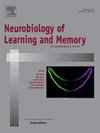Pattern separation during encoding and Subsequent Memory Effect
IF 1.8
4区 心理学
Q3 BEHAVIORAL SCIENCES
引用次数: 0
Abstract
Memory retrieval has been extensively studied in relation to the encoding processes that precede access to stored information. Event related potentials (ERP) research has compared brain potentials elicited during the study phase of successful and unsuccessful retrieval, finding greater activation for the subsequent retrieval information. In this work we were interested in exploring the neural markers associated to subsequent recognition when similar memories are subsequently encoded. We used a Subsequent Memory paradigm in which we manipulated the number of similar items within a category (2 or 6) that participants encoded. Manipulating the number of similar encoded items within a category allowed us to test whether encoding markers of subsequent recognition depend solely on memory trace strength or, on the contrary, successful recognition is influenced by subsequently presented similar memories, and consequently may not be reflected in higher activation in such cases. After a 20-minute period, participants performed a recognition task providing one of a three-option judgement: “old”, “similar” and “new”, which allowed us to test if the amplitude of ERP waveforms varied based on the similarity judgement of the unrecognized encoded item. We did not observe a significant parietal subsequent memory effect, however, old hits and similar false alarms were both significantly different from similar correct rejections and old false alarms in ERP retrieval. These findings suggest that differences in brain responses between conditions are specifically related to the retrieval process and not the encoding process, indicating potential differential effects on memory during retrieval. Moreover, it is also possible that differences in brain responses develop or change over the rest time between phases, influencing how these conditions manifest across different stages of information processing.
编码过程中的图案分离与后续记忆效应
记忆检索与获取存储信息之前的编码过程有关,已被广泛研究。事件相关电位(ERP)研究比较了成功和不成功检索的研究阶段所激发的脑电位,发现后续检索信息的激活程度更高。在这项研究中,我们有兴趣探索当类似记忆被后续编码时,与后续识别相关的神经标记。我们使用了一种后续记忆范式,在该范式中,我们操纵了参与者编码的类别中相似项目的数量(2 或 6)。通过改变一个类别中类似编码项的数量,我们可以测试后续识别的编码标记是否只依赖于记忆痕迹的强度,或者相反,成功识别是否会受到随后出现的类似记忆的影响,因此在这种情况下,后续识别的编码标记可能不会反映在更高的激活度上。经过 20 分钟后,受试者进行了一项识别任务,从三个选项中选择一个进行判断:"这使我们能够测试 ERP 波形的振幅是否会根据未识别编码项的相似性判断而变化。我们没有观察到明显的顶叶后续记忆效应,但是,在ERP检索中,旧的命中和相似的误报都与相似的正确拒绝和旧的误报有明显的不同。这些研究结果表明,不同条件下大脑反应的差异与检索过程而非编码过程特别相关,这表明在检索过程中记忆可能会受到不同的影响。此外,大脑反应的差异也有可能在不同阶段之间的休息时间内发展或变化,从而影响这些条件在信息处理不同阶段的表现。
本文章由计算机程序翻译,如有差异,请以英文原文为准。
求助全文
约1分钟内获得全文
求助全文
来源期刊
CiteScore
5.10
自引率
7.40%
发文量
77
审稿时长
12.6 weeks
期刊介绍:
Neurobiology of Learning and Memory publishes articles examining the neurobiological mechanisms underlying learning and memory at all levels of analysis ranging from molecular biology to synaptic and neural plasticity and behavior. We are especially interested in manuscripts that examine the neural circuits and molecular mechanisms underlying learning, memory and plasticity in both experimental animals and human subjects.

 求助内容:
求助内容: 应助结果提醒方式:
应助结果提醒方式:


